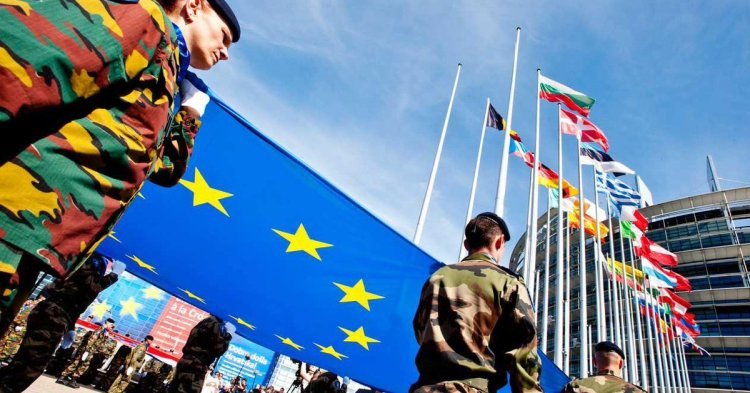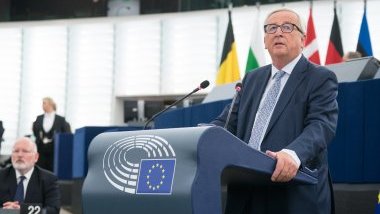ZOOM-IN: PESCO
Permanent Structured Cooperation (PESCO) in defence has long been the “sleeping beauty” of the Lisbon treaties: the treaty provisions on PESCO (Articles 42.6 and 46 TEU, and Protocol 10) had never been used until this year. Launched in the context of the EU Global Strategy for Foreign and Security Policy (EUGS), it allows Member States, who are capable and willing, to “increase their effectiveness in addressing security challenges and advancing towards further integrating and strengthening defence cooperation within the EU framework”. Aimed at the joint development of military capabilities, PESCO consists of voluntary participation. And while decision-making remains in the hands of States, the commitments they undertake are binding. PESCO is connected to other European initiatives in Defence, such as the European Defence Fund and CARD.
So far, three steps have been taken by Member States: in September, they listed their commitments in several areas such as defence investment, capability development and operational readiness. In November, they launched the first formal step by notifying the High Representative and the Council of the principles and commitments they have agreed to. Finally, in December, they officially established PESCO via a Council decision.
Twenty-five Member States participate (all but Denmark, Malta and the UK) on a first list of 17 projects, in the area of capability development and in the operational dimension ranging from the establishment of a European Medical Command, an EU Training Mission Competence Centre, Cyber Rapid Response Teams and Mutual Assistance in Cyber Security, to Military Disaster Relief and an upgrade of Maritime Surveillance.
The full list can be found here
Read more in the European External Action Service’s PESCO factsheet
Initially pushed by France and Germany, PESCO seems to be more closely aligned with Germany’s preferences: a PESCO that is less ambitious but wider; while Paris preferred a deeper, more ambitious and more capable PESCO with a smaller group of countries.
Read more in The Financial Times.
European military cooperation: How to defend Europe?
“There is a strategic awakening of Europe”, so is PESCO described by a French military official. Europe has to prepare itself for new circumstances, like terrorism, cyber attacks and the fear of Russian aggression towards European countries. Nevertheless, PESCO is not meant to compete with NATO, but rather to encourage common missions and interconnect national armaments industries. The EU today, has more than 178 different weapon systems. Stronger cross-border cooperation can ascertain that the EU can keep up with the pace of the global technology race. However, the real test for PESCO will be how to deal with new joint industrial projects. The EU needs to find common solutions to make military equipment similar, while overcoming national differences – this is a long term project and will be an endurance test. For example: replacing the German Eurofighter and the French Rafale will take more than a decade of planning!
Read more in EurActiv.
Ireland joining NATO: is this the start of a European army?
Ireland is a country that traditionally has been opposed to joining military alliances and has a long history as a neutral State in international conflicts. Nevertheless, the fact is that when Ireland chose to join PESCO, it did not cause any mass protest or a constitutional challenge. The Irish Taoiseach Leo Varadakar explained Ireland’s reason for joining that easily: “My view is that a Europe that is worth building is a Europe that is worth defending”. Moreover, Irish analysts have instead focused on the fact that PESCO is non-binding and that countries can opt-in or out to different projects. Accordingly, a State like Ireland could join a project that seemingly has been labeled as the future creation of a “European army”. While, Professor Ben Tonra highlights the Ireland’s opportunity to take part in a wide range of new research programs while also being better equipped for peacekeeping missions worldwide.
Read more in The Independent.
Elections in the Visegrad Four: a threat to common security?
The Visegrad group or Visegrad four is a Union of States composed of the Czech Republic, Hungary, Poland and Slovakia. Since the fall of the Berlin wall these four countries cooperate closely. Their first aim was to become members of NATO and the EU but their common cultural heritage links them even more. Thus, they even established their first common Battlegroup in 2016, an initiative which will normally be reconducted in 2019.
However, the recent elections in Austria and the Czech Republic during this autumn might change the priorities of the V4, thus affecting their contribution to common defense and the European integration as a whole.
Indeed, Sebastian Kurz, the leader of the Austrian’s People Party, obtained the highest percentage of votes on the 15 October 2017. His political ideas regarding especially migration make Austria a good candidate for joining the Visegrad group. The alliance has actually made the opposition to immigration a condition of membership. The coalition government with the far-right party FPÖ also supports this merger; indeed, it was part of their election program. Such an extension would represent a stronger counterbalance against Brussels and Macron, according to Orban who considers that the Commission, the Council and the Parliament failed to protect the Schengen treaty.
Also the Czech elections won by Andrej Babiš, leader of the party ANO, who claims to do business and not politics, will change the current balance. In his first post-election speech Babiš highlighted that his program will be pro-European and pro-NATO, but the fear of an autocratic and Putin-favourable regime remains. That means that, even if the government will not be openly opposed to the EU it won’t either be a counterbalance against Hungary and Poland who took the lead of the Visegrad Four. The influence upon common security and defence policy of the emergence of such an integration-opposed alliance within the EU is hard to predict. For now, the 2019 V4 Battlegroup is maintained and none of these Member States opposed to the PESCO, however, considering the very NATO and EU critical position tough negotiations seem to be ahead.
Read more in EUObserver, Express, and Visegrad Post.








Follow the comments: |
|
